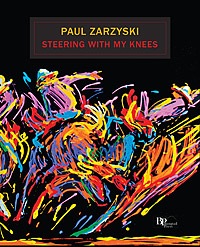
Currently one of the West’s most acclaimed poets, 40 years ago Zarzyski showed up at a poetry workshop taught by the University of Montana’s Richard Hugo with only a handful of poems to his name. But under Hugo’s guidance he learned both the mechanics and music of poetry.
Zarzyski now has a photograph in his studio of his mentor smiling and holding a freshly caught trout, captioned by newspaper headlines that Zarzyski collected during Hurricane Hugo: “Hugo Bears Down.” “Hugo Rages On.”
Since leaving Hugo’s classes, Zarzyski, a self-described “Polish-Mafioso-Rodeo-Poet,” has written some of the finest rodeo poetry ever committed to paper, and performed in venues such as the Library of Congress and Kennedy Center Millennium Stage. One of those rare poets who has been able to make his living through poetry, he’s just coming off a pair of projects that both broadened his literary horizons and scared the heck out of him.
His 2011 book, 51: 30 Poems, 20 Lyrics, and 1 Self-interview, represented his first endeavor at memoir, and 2014’s Steering with my Knees, a collection of “lite” poetry, collected over 70 poems, with more than 40 of them having never before been unpublished. Despite the book’s tendency toward the humorous, the gags never trump compassion.
 Black and white illustrations by Missoula artist Larry Pirnie, a longtime Zarzyski friend and collaborator, grace each of 13 section breaks. Among Zarzyski’s various books, Steering stands as perhaps the most thorough reflection of his sensibilities and talents. For readers who are just getting to know his poetry, this is the place to start. And for those who are already familiar with his work, this is a delightful (and essential) addition to their collection.
Black and white illustrations by Missoula artist Larry Pirnie, a longtime Zarzyski friend and collaborator, grace each of 13 section breaks. Among Zarzyski’s various books, Steering stands as perhaps the most thorough reflection of his sensibilities and talents. For readers who are just getting to know his poetry, this is the place to start. And for those who are already familiar with his work, this is a delightful (and essential) addition to their collection.
Even with eight previous books already under his belt, Zarzyski is finding he has a special relationship with this duet of newest efforts, both published by Bangtail Press. Considered to be companion books, they are his only two collections released since the 2008 and 2010 deaths of his beloved parents, and each offers a distinct yet compatible approach to self-therapy: serious reflection and playful nostalgia. What tears can’t purge, laughter can.
Do you come to ride?
Though his vision extends across the globe, Zarzyski’s heart is firmly rooted in the West, specifically Montana, which he has called home for 40 years. Born in Hurley, Wisconsin in 1951, he drifted westward in the early 1970s and landed in Hugo’s workshop.
For a period after receiving his 1976 MFA degree, Zarzyski taught Hugo’s classes, and Missoula remained his home base for years. His remembrances of those Missoula days include colorful anecdotes of wild writers having wild nights. Authors such as Jim Crumley, James Welch, Rick DeMarinis, and others make cameos, going about the hard business of staving off sobriety. “This was a time,” as Zarzyski quotes author Jim Harrison, “when writers behaved badly.”
Zarzyski dedicates the poems of Steering with my Knees to friends, lovers, colleagues, acquaintances, mentors, as well as, of course, Mr. Mink. The poems celebrate the depth and breadth of a life well lived in the West, with titles that, while often extravagant, point to larger meanings.
“How the Lord Throwed-In with Mom to Make Me Quit the Broncs,” is only a few sections removed from “Escorting Grammy to the Potluck Rocky Mountain Oyster Feed at Bowman’s Corner – A Love Poem.” And even if you’re not a regular reader of poetry, how can you not dip into “The Whale in My Wallet” and “The Day Beelzebub Gave His Jezebel a Hotfoot” ?
Likewise, the song lyrics in 51 reflect Zarzyski’s zeal for life, and they’ve been recorded and performed by a host of notable musicians, including Ian Tyson, Tom Russell, David Wilkie, and Betsy Hagar. Wylie Gustafson and Zarzyski won the Western Writers of America’s 2010 Spur Award for Best Western Song for “Hang-n-Rattle,” which asks the “quintessential western question: Did you come to ride? Or did you come to hide?” Zarzyski always comes to ride.
Grace by “Big Medicine”
Sitting at his kitchen table, Zarzyski is as excited about the future as he is reflective about the past. He’s been fortunate to be graced by what he calls “Big Medicine” at every turn in his life. He’s thankful. Zeke looks pretty happy, too.
Yet it seems like we should be the ones thanking Zarzyski – for offering us his words, for asking the tough questions and not hiding from the answers, for giving us the gift of poetry, for sharing his Big Medicine. “You just live and you write about living,” he says. “And then you hope against all hope that the poems you raise into adulthood and send off into the world have something to offer other people’s lives.
“That’s what I’ve done and that’s what I’m going to continue to do. To me, that’s wealth. It’s a different kind of wealth, but it is wealth.”
– Myers Reece
About the author
Myers Reece is a freelance writer. His journalism, essays and fiction have appeared in newspapers and magazines across the country. He was a founding member of the award-winning Flathead Beacon and most recently was the publication’s senior writer. He lives in Kalispell with his wife and two dogs.